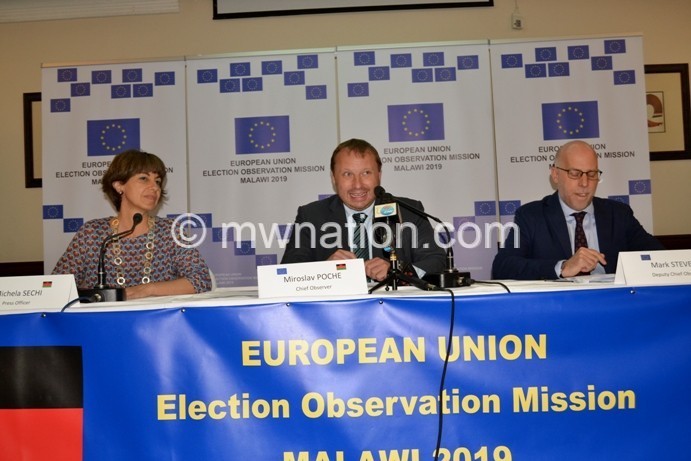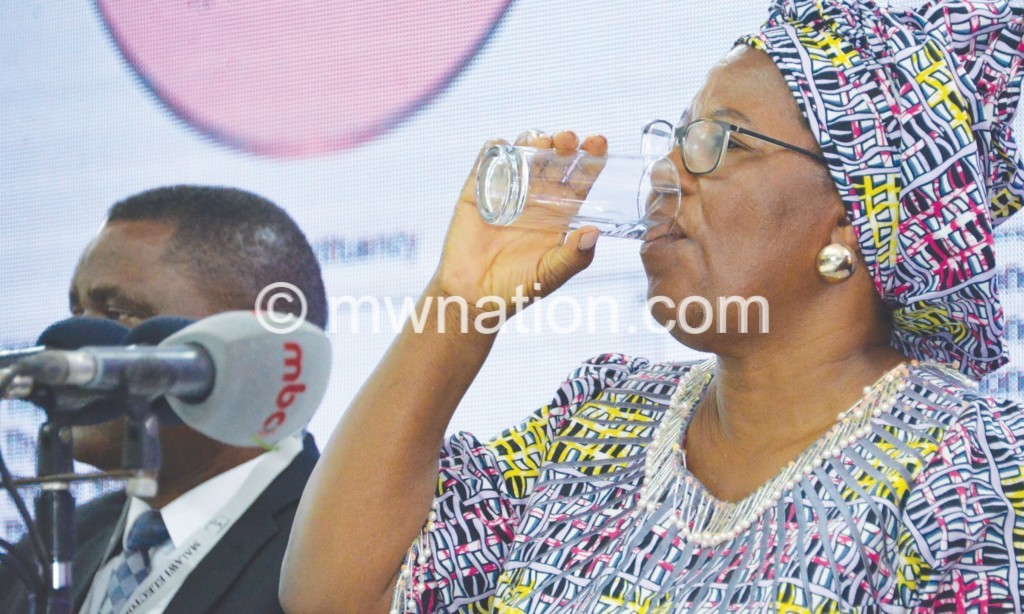EU faults vote counting
- Urges reforms
- As opposition demand nullification
The European Union (EU) Election Observation Mission (EU-EOM) to Malawi has said vote counting in the May 21 2019 Tripartite Elections was challenged by poor conditions and poor adherence to procedures.
In a 12-page preliminary statement, dated May 23 2019, the mission has also punched holes in the electoral legal framework, especially on the absence of deadlines for filing and adjudicating election disputes.

Already, there is controversy on the presidential results, which the Malawi Electoral Commission (MEC) declared Peter Mutharika of Democratic Progressive Party (DPP) winner with 1 940 709 votes or 38.57 percent of the votes cast.
He was trailed by Lazarus Chakwera of Malawi Congress Party (MCP) with 1 781 740 votes (35.41 percent) while immediate-past vice-president Saulos Chilima of UTM came third with 1 018 369 votes or 20.24 percent.
Chilima has already filed with the High Court, praying for nullification of the results while Chakwera will be filing in due course, seeking the same action from the courts.

In the statement, the EU-EOM has observed that the vote count was transparent with party monitors present in all polling stations observed.
However, the EU-EOM mission said closing was assessed as bad to very bad in 12 out of 32 polling stations observed, mostly due to inconsistency in following procedures and problems with reconciliation and completing the result sheets.
It reads: “Counting continued across the country throughout most of the night, in difficult conditions such as poor light, and inadequate premises. Problems with ballot reconciliation and in completing the results forms were noted in 19 and 16 respectively out of 32 polling stations observed.”
The proper procedures were not followed in 15 out of 32 polling stations, EU-EOM teams observed.
Preliminary reports indicate that the problems with the results sheets are impacting on the tallying process in some areas.
While appreciating that fundamental rights and freedoms for the conduct of democratic elections are largely provided, the EU-EOM has said reforms are required to enhance the legal framework.
The mission has observed conflicting provisions between the Constitutional, Presidential and Parliamentary Elections Act (PPEA), Local Government Elections Act (LGEA) and the Electoral Commissions Act.
The disparities, according to the EU-EOM, pertain to, among others, voting rights, election observation and sanctions for election related criminal offences.
It adds that legal provisions do not adequately ensure transparency and accountability of party and campaign finance or help safeguard a level playing field.
On complaints and dispute resolution, which have marred Malawi elections since re-adoption of multiparty, the EU-EOM has said there are no deadlines for filing and adjudicating election disputes in election laws, except for challenging results at the High Court.
“This absence of deadlines could undermine the right to effective legal redress. In a welcome development, the High Court Civil Procedure Rules (2017) rectify this lacuna to an extent, by establishing deadlines for election petitions to the High Court.
“Moreover, the Chief Justice has undertaken initiatives to rationalise the High Court administration with the aim to improve the handling of election petitions and to ensure consistency in jurisprudence.”
Already, a Sadc Election Observation Mission (Seom) preliminary report has said while the May 21 2019 Tripartite Elections were professionally managed, it observed a number of electoral processes that need reforms.
In its preliminary report, Seom said it was aware that the Special Law Commission was tasked with electoral reforms in Malawi after the 2014 Tripartite Elections and it presented its final report to the Ministry of Justice and Constitutional Affairs in April 2017.
However, the mission recommended that electoral laws still need to be reformed, among others, on appointment of MEC commissioners, period for voter registration and the role of the State broadcaster.
On voter registration, the mission said while MEC commissioners are appointed by the President in consultation with leaders of the political parties represented in Parliament, “there is, however, need for the appointment process to be improved to enhance inclusivity, transparency and good governance”.
Seom further observed that MEC’s failure to meet its initial target of registering nine million voters—only managing to register over 6.8 million voters—should call for law review so that electoral laws allow continuous voter registration in between election cycles which can increase the registration period.
The report further urged stakeholders to improve the social, cultural and political environment to enhance the participation and inclusion of female candidates in line with the Sadc Protocol on Gender and Development.
Seom noted several stakeholder concerns regarding allegations of selective election-related criminal law enforcement, stating there is need to improve the level of stakeholder confidence in the law enforcement agencies.
In a separate statement, the Comesa Observer Mission, which is led by Hope Kivengere—a member of the Comesa committee of elders—said MEC’s decision to allow specific categories of persons to vote in polling centres they did not register should have been communicated earlier.
MEC chairperson Justice Jane Ansah said during declaration of results last Monday, that the commission had thoroughly reviewed all the complaints that were lodged for the presidential election.
She declared the presidential elections to be free and fair and that the results were the true reflection of the will of the people of Malawi.
Voting in the tripartite elections took place on May 21 2019 in all the 5002 polling stations.
According to Ansah, out of 6 859 570 registered voters, 5 105 983 turned up for polling representing 74.44 percent. A total of 74 719 votes were declared null and void representing 1.09 percent.





